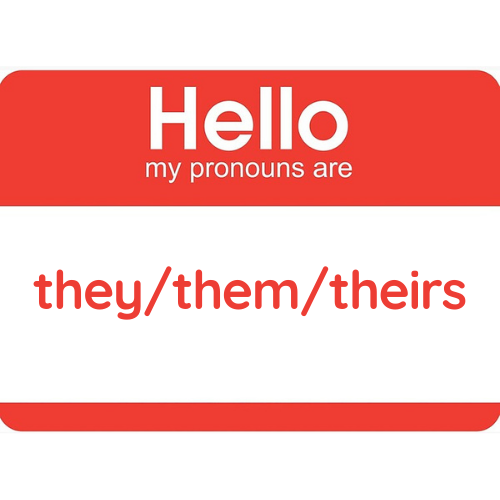Pronouns are words like they, she, he and ze, that stand in for nouns and are used to refer to people in the singular third person. Oftentimes pronouns are associated with gender which is incredibly problematic when the gender of a person is unknown. Because of this, people make assumptions about an individual’s gender based on their name, appearance or how they act. These assumptions can be incorrect, and despite correctness, making assumptions sends a dangerous and oppressive message… in order to be a certain gender people have to look, or act a particular way. This ideology marginalizes those who do not fit into society’s strict and oppressive gender expectations.
Sharing pronouns has become a common practice in many spaces. Sharing pronouns can be an amazing and easy way to be an ally as well as create space for everyone to feel respected and seen in their gender identity. At CAPS we recognize the importance of using our power to be inclusive and intentional in the spaces we create and engage with. Our Trans Care Team chooses to share out their pronouns to reflect their dedication to being allies of all students, staff and faculty at the University of Michigan. CAPS’ staff understands that when only trans, non-binary, and gender non-conforming people share pronouns, it makes it easy for them to be targeted and harrassed. By stating pronouns both in-person and online regardless of gender identity, we can take power away from those looking to harm and harass gender diverse people.
With that in mind, we want to acknowledge that sharing pronouns IS NOT always the best way to create space for ALL students. While there are benefits to sharing pronouns, this practice can be incredibly difficult for students who are still trying to understand their gender identity. Students who may be on the verge of coming out can feel pressured to share pronouns that may not reflect their true gender identity. Additionally in primarily cisgender spaces, sharing pronouns can single out trans and non-binary people. Sharing pronouns should ALWAYS be a choice and a way to create space where it is desired.
When we create spaces for sharing pronouns, we also need to have space to not share pronouns. So what does that look like? When asking about pronouns one solution is to ask “what are your pronouns or do you prefer I just use your name?” By using someone’s name exclusively you can avoid making harmful assumptions as well as avoid forcing someone to out themselves or remain closeted.
Additional Resources:
- https://spectrumcenter.umich.edu/article/designated-pronouns
- https://medium.com/national-center-for-institutional-diversity/making-space-for-them-her-him-and-prefer-not-to-disclose-in-group-settings-why-1deb8c3d6b86
- https://www.insidehighered.com/views/2018/09/19/why-asking-students-their-preferred-pronoun-not-good-idea-opinion
- https://www.mypronouns.org/what-and-why

